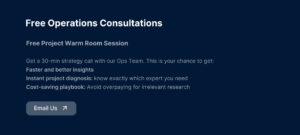Expert Interview Advantages and Disadvantages
Expert interviews hold many advantages such as in-depth specialized knowledge, unique insights, and flexibility to enable researchers to gain both credible and qualitative data.
Nevertheless, they have some disadvantages, such as possible bias from the interviewer, time-consuming logistics, small sample sizes, and the impossibility to ensure confidentiality, as well as participant fatigue.
Why Expert Interviews Are a Decision Maker Go-To
In a competitive business environment, being able to make an informed decision is no longer an advantage; it is a requirement. Expert interviews are one of the most powerful intelligence-gathering tools for decision-makers, VCs, startups, and SMEs.
This form of qualitative research is based on face-to-face interviews with the people who are experts in the field of study, in order to gain insight that is often not readily apparent in data sheets and market reports. Such interviews can throw light on complicated issues and point to unexpected possibilities when conducted in the right manner.
The Power of Insight: Benefits of Expert Interviews
The quality and the depth of the information that comes about from expert interviews is the main attraction itself. They give a direct link with people whose years of special experience.
Access to In-depth and Specialized Knowledge
Access to expert, detailed knowledge, not available using other research approaches, is one of the main strengths of expert interviews. Insight specialists are able to provide context, build upon complex trends within an industry, and demystify emerging concerns, which is an invaluable detail when it comes to tactical decision-making.
Unmatched Flexibility
Expert interviews are dynamic, not like the surveys. A semi-structured interview like this one will give room for the interviewer to modify their questions according to the expert’s answers and explore deeper areas that are previously unexplored and valuable. This flexibility allows the dialogue to be customized to the information that is most relevant to the individual.
Increased Credibility and Unparalleled Insights
When you have information that is directly obtained from a known authority, a great amount of force is placed on the research you are conducting, making the results of your research much more reliable. Moreover, specialists can provide original insights and uncover hidden information that cannot be detected in quantitative data, resulting in a new course of action.
Pros and Cons at a Glance
To make an informed decision, it’s important to consider the pros and cons of expert interviews.
| Advantages | Disadvantages |
| Access to specialized, in-depth knowledge | Time-consuming to prepare, execute, and analyze |
| High credibility and authoritativeness | Potential for interviewer and confirmation bias |
| Flexibility to adapt and explore topics deeply | Limited sample size can affect generalizability |
| Uncovers unique, hidden insights | Can be expensive and resource-intensive |
| Rich, nuanced qualitative data collection | Difficulty in accessing and scheduling top experts |
Navigating the Challenges: Disadvantages of Expert Interviews
Even though this is powerful, it is important to appreciate the drawbacks of expert interviews in order to reduce risks. These challenges are the first step in the formulation of a good research strategy.
The Time Commitment
One of the drawbacks is that interviews are time-consuming. This process includes the identification and vetting of experts, scheduling, preparation and conduct of the interview, and transcribing and analyzing the qualitative data. All of this requires a lot of effort.
Potential for Interviewer Bias
The interviewer may accidentally ask leading questions or interpret the answers in a way that reinforces previously held beliefs. The effect of the interviewer may affect the objectivity of the findings.
Limited Sample Size
The number of expert interviews that are contained within an individual project is usually small because of the time and cost incurred. A minuscule sample size may affect the extrapolation of the results to be applied to a large population.
Logistical Hurdles
It can be difficult to find and access the right people with the right expertise. They have busy schedules and may be located at different geographical locations, which becomes another complication to the process.
Comparing Interview Types
The key to balancing flexibility and consistency is choosing the right structure.
| Interview Type | Best For | Flexibility |
| Structured | Quantitative data, comparing responses directly | Low |
| Semi-Structured | Qualitative data, exploring topics in-depth | Medium |
| Unstructured | Exploratory research, gathering detailed narratives | High |
Best Practices for Getting the Best ROI
The important thing is to use the potential of this approach in an effective way by doing it strategically. The first step is to determine concrete goals. You will need to determine what you need to know before you begin the outreach. Composing an intelligent interview guide, rather than a script, allows for a free, but structured conversation.
If companies have an interest in simplifying this process, they can also partner with a specialized company, like Nexus Expert Research. These are the companies that do the hard part of sourcing, vetting, and scheduling so that you can just focus on the insights.
Making the Right Decision for Your Business
You will need to consider the advantages and disadvantages of using interviews in relation to your particular aims, budget, and time schedule. Although expert interviews take a significant amount of time and resources, they can be useful in terms of the range and quality of information they generate.
Properly implemented, they can provide the intelligence needed to beat the competition to market position and achieve strategic growth.
Ready to unlock some industry insights? Contact Nexus Expert Research and connect with top experts today.

